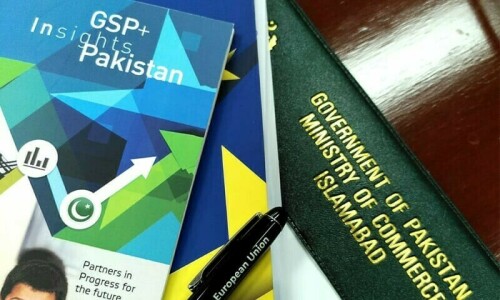ISLAMABAD, Oct 3: The International Monetary Fund conditionalities are major hurdles to investment that also put at risk the current positive macro-economic indicators and economic growth.
This was stated by Dr A.R. Kemal, Director, Pakistan Institute of Development Economics (PIDE) at a meeting organized by the Friedrich Ebert Stiftung with the visiting member of German parliament, Mr Klaus-Werner Jonas.
The meeting was attended by a select group of economists, National Assembly members, trade and labour leaders. Dr Parvez Tahir, Chief Economist, Planning Commission, was also present.
Germany is an important member of the OECD, which has decisive clout in the policymaking processes of the Brettonwoods institutions including IMF.
Public sector investment, Dr Kemal pointed out, was vital for encouraging private sector investment. In this connection, the Government could have utilized the foreign exchange reserves of over $11 billion for this purpose, but the IMF does not allow such diversion in the interests of Pakistan, although it has no objection to debt swaps.
This is quite understandable because IMF and its sister multilateral agencies themselves are major creditors of Pakistan.
In what served as the grist for the subsequent lively debate, Dr Kemal started his overview of the economic situation by asserting that the financial indicators were good but the real sector “is in deep trouble”, with poverty being on the ascendant, thousands of industries being sick resulting in fast rising unemployment rate.
The political governments during 1990s inherited large fiscal deficits, high balance of payments gaps, mounting debt, etc. They remained pre-occupied with tackling the macroeconomic instability in accordance with the programme of the IMF.
The PIDE Director was, however, skeptical about the sustainability of financial indicators as claimed by the government. The fiscal deficit, he argued, was down because the government was not paying any debt, thanks to rescheduling in the post-9/11 scenario. What would be the situation after “we do start paying debt,” he wondered.
The government figures put money supply at 15-16pc. It might have been 30pc. He, however, observed that with money supply at 15pc or so, the inflation rate was a little over 3pc, leaving 12pc unutilized.
Huge amounts of money were lying idle with the banks because the people were neither investing nor spending it. Presumably, they were waiting for the exchange rate of dollar or euro to go up.
Earlier, Mr Jonas, a member of the Parliamentary Committee on Economic Cooperation and the Committee on Petitions said it was his first visit to Pakistan. Regretting that Pakistan had been given a bad image in his country, he said he had come here for a first-hand knowledge of the situation in Pakistan with a view to changing the misperceptions about this country.













































Dear visitor, the comments section is undergoing an overhaul and will return soon.